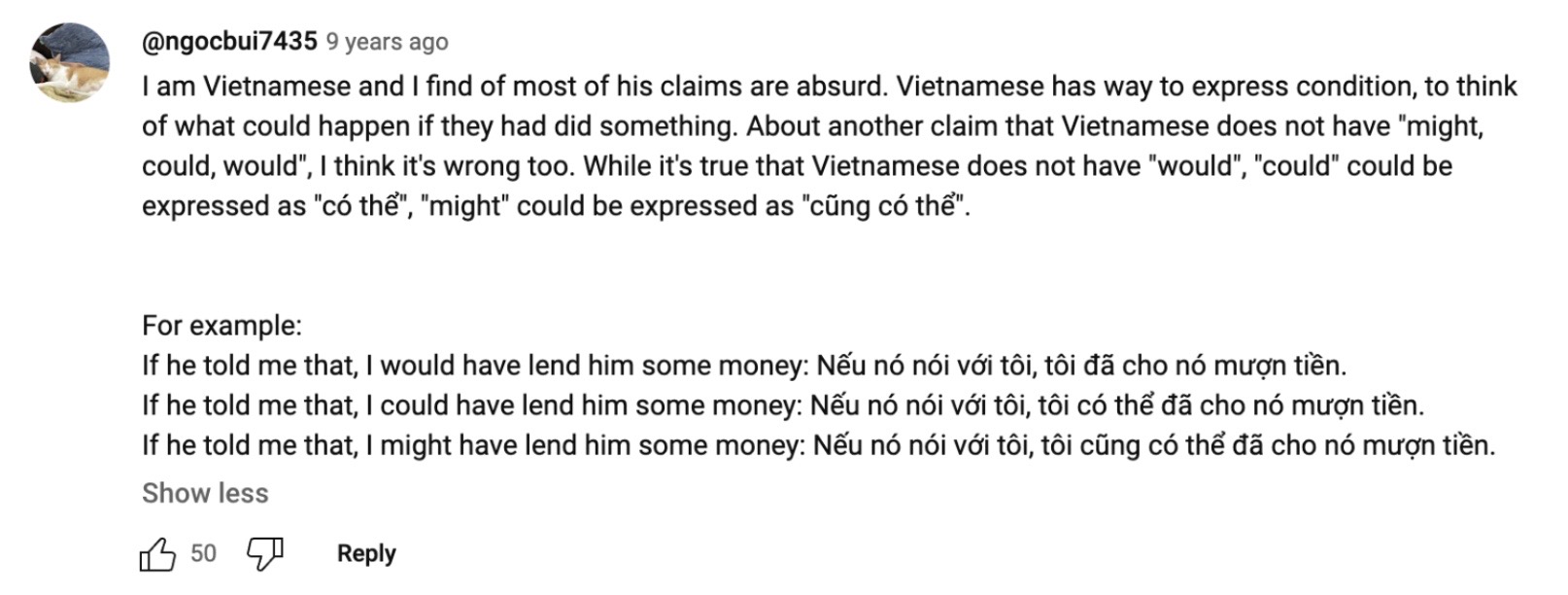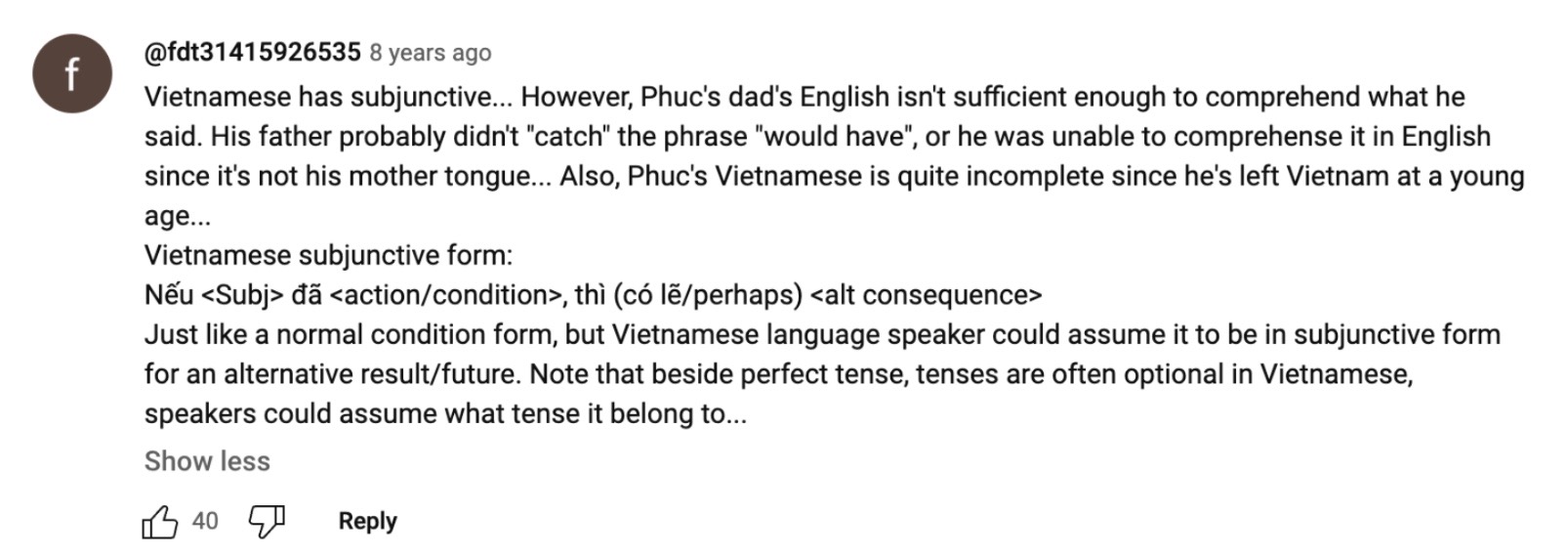Against the Grain: Listening for Controversy
paired with “Grammar, Identity, and the Dark Side of the Subjunctive”
Hashtags
#close reading, #discussion, #argument, #ways of knowing, #critique, #context, #comparison, #multilingual, #60 minutes
This discussion is designed to deepen interaction with the primary text by connecting to paratext in the form of YouTube comments, which critique the main arguments emerging from personal narrative. It may be most useful as a follow-up discussion and can link to other discussions or assignments about forms of writing.
Introduction
JS: Phuc Tran’s TedTalk offers a compelling personal story, in part because he weaves his humor and self-confident geekiness with powerful memories of his family’s refugee experiences and resettlement in the U.S. Like other Vietnamese American, refugee, and immigrant authors, Tran turns to his personal story to tell his family’s story in order to speak of history that is not well understood or appreciated in mainstream American culture. Indeed, his narrative not only exposes the bullying pressures to assimilate that he and his family faced but also becomes an expression of how he has command over this culture to spin his own story and to emerge as the person he really wants to be.
Yet, if we listen closely to his presentation, at times, he relies on his own experiences to make broader claims about language, expression, relationships, and identity, which don’t always hold up. Many of the YouTube comments below his video offer rebuttals and complications in what he says about the Vietnamese language in particular. The exchange that occurs between the main text and this paratext flesh out some of the underlying arguments about language and outlook, which one might not interrogate by listening to Tran’s narrative alone.
The following discussion activity is designed to dive deeper into the core issues raised in Tran’s talk and may also generate productive conversations about the extent to which we can rely on our personal experience to develop arguments and the value of incorporating multiple perspectives for deeper understanding.
Guide
Close Read: Audience Reactions
One of the affordances of engaging with a YouTube video as text is that there is so much information around the main content which can provide some clues on how to complicate the ideas presented. In the case of Phuc Tran’s talk, he presents a personal narrative that becomes the basis of an argument about language as a lens, which means it can shape our personal, cultural, and even national outlook. Take a look at some of the YouTube comments that begin to push back on the ideas he presents.
Use the ones below or go back to the YouTube page to find your own leads:




Questions:
- What are the most important critiques you notice in the comments?
- How do the comments reframe some of the key moments in Tran’s talk?
- What questions do you have based on the debate we see across the main talk and the comments?
Discuss: Grammar and Identity
In many ways the title of Tran’s talk, “Grammar, Identity, and the Dark Side of the Subjunctive” tells us about the key concepts that link his personal narrative and his argument about language. Yet, the YouTube comments above complicate his story. Beyond strict grammatical “rules” dictating what’s possible in language—for example, whether the subjunctive mood exists—the audience’s comments suggest that one’s use of language reflects both cultural preference and individual choice and that there are many ways of expressing concepts beyond a simple grammatical structure.
- In what ways do Tran’s stories really seem to reflect language, and when do you see other dynamics? Focus on one of the key moments in the video and discuss again how Tran describes language working. Then, discuss how you see other forces like culture or experience shape this moment. How are these two interpretations related? What’s more convincing to you and why?
- The Sapir-Whorf hypothesis contends that the structure of a language determines how native speakers perceive the world and categorize experience. This is also known as linguistic relativity, an approach in linguistics that has been debated, criticized, and largely discredited. What are the implications of this hypothesis for understanding culture, communication, and even identity? To what extent do linguistic differences reveal a different outlook and at what point does this lead to stereotypes? Revisit some of the key moments of miscommunication and misunderstanding that Tran recounts. You may also want to revisit the validity of his claim that “different nations’ feelings of optimism” reflect their languages.
To understand more about the Sapir-Whorf hypothesis and linguistic relativity, check out this short video:
Linguistic Relativity: Does Your Language Change How You See The World?
To dive deeper into linguistic diversity in a way that builds on this hypothesis, watch another TedTalk titled “How Language Shapes the Way We Think”:
- Connecting the ideas from Tran’s TedTalk, the youtube comments, and insights from your discussions, what do you think is the relationship between language, culture, and identity? How do you experience this? How might you “re-understand” your own languages (as Tran suggests) as a result of these discussions? You may even start by reflecting on how you inhabit the subjunctive and indicative moods.
Media Attributions
- @ngocbui7435 post © @ngocbui7435 is licensed under a CC BY-NC-SA (Attribution NonCommercial ShareAlike) license
- @fdt31415926535 post © @fdt31415926535 is licensed under a CC BY-NC-SA (Attribution NonCommercial ShareAlike) license
- @leevanbinh post © @leevanbinh is licensed under a CC BY-NC-SA (Attribution NonCommercial ShareAlike) license
- @mrnaruwan post © @mrnaruwan is licensed under a CC BY-NC-SA (Attribution NonCommercial ShareAlike) license
analysis that is grounded in textual details as evidence and material for interpretation
See:
Tracing Citations (exploration)
Body as Metaphoric Space (exploration)
Poetry and Science: Epistemology through Language (exploration)
Aphoristic Translation (exploration)
Parsing Themes (exploration)
Reading the “Fine Print” (exploration)
Juxtapositions of Silence (exploration)
Self Reflection, Collective Change (exploration)
Insufficient Definitions (exploration)
Dialogue Over Time: A New Boogaloo: “How Beautiful We Really Are” (exploration)
Against the Grain: Listening for Controversy (exploration)
activity designed for active exchange with peers, may be small group or large group
See:
Against the Grain: Listening for Controversy (exploration)
Aphoristic Translation (exploration)
Body as Metaphoric Space (exploration)
Building an Opinion (exploration)
Critical Learning Reflection (exploration)
Insufficient Definitions (exploration)
Parsing Themes (exploration)
The Point of Education? (exploration)
Reading the “Fine Print” (exploration)
strong claims presented with reasoning, often demonstrate rhetorical strategies of persuasion
See:
Building an Opinion (exploration)
Against the Grain: Listening for Controversy (exploration)
See:
"Asters and Goldenrod"
“Grammar, Identity, and the Dark Side of the Subjunctive”
“Place Name: Oracabessa”
“Vão/Vòng A Conversation with Katrina Dodson"
Against the Grain: Listening for Controversy (exploration)
Critical Learning Reflection (exploration)
Indigenous Perspectives of Western Science (exploration)
Insufficient Definitions (exploration)
The Point of Education? (exploration)
Poetry and Science: Epistemology through Language (exploration)
analysis that evaluates arguments through differing viewpoints or examines assumptions and norms, for example
See:
Critical Learning Reflection (exploration)
Dialogue Over Time: A New Boogaloo: “How Beautiful We Really Are” (exploration)
Work Culture Reexamined (exploration)
Against the Grain: Listening for Controversy (exploration)
analysis that connects to relevant background and bigger issues
Set:
Music Trails (exploration)
Historical Contexts (exploration)
Translations Across and Within Languages (exploration)
Reading the “Fine Print” (exploration)
Language Life Story (exploration)
Dialogue Over Time: A New Boogaloo: “How Beautiful We Really Are” (exploration)
Work Culture Reexamined (exploration)
Against the Grain: Listening for Controversy (exploration)
analysis that evaluates similarities and differences between two or more examples
See:
Against the Grain: Listening for Controversy (exploration)
Body as Metaphoric Space (exploration)
Collage: Found, Donated, Repeated with Difference (exploration)
Indigenous Perspectives of Western Science (exploration)
Insufficient Definitions (exploration)
Juxtapositions of Silence (exploration)
Poetry and Science: Epistemology through Language (exploration)
Reading the “Fine Print” (exploration)
See:
“As a Child in Haiti, I Was Taught to Despise My Language and Myself”
“Gun Bubbles”
“How to Tame a Wild Tongue”
“Place Name: Oracabessa”
“Puerto Rican Obituary”
“Saving a Language You’re Learning to Speak”
“Three Ways to Speak English”
"To Speak is to Blunder"
“Vão/Vòng A Conversation with Katrina Dodson"
Against the Grain: Listening for Controversy (exploration)
Historical Contexts (exploration)
Parsing Themes (exploration)
Translations Across and Within Languages (exploration)
activity designed to take about 60 minutes to complete
See:
Music Trails (exploration)
Historical Contexts (exploration)
Critical Learning Reflection (exploration)
Poetry and Science: Epistemology through Language (exploration)
Aphoristic Translation (exploration)
Reading the “Fine Print” (exploration)
Self Reflection, Collective Change (exploration)
Collage: Found, Donated, Repeated with Difference (exploration)
Against the Grain: Listening for Controversy (exploration)

